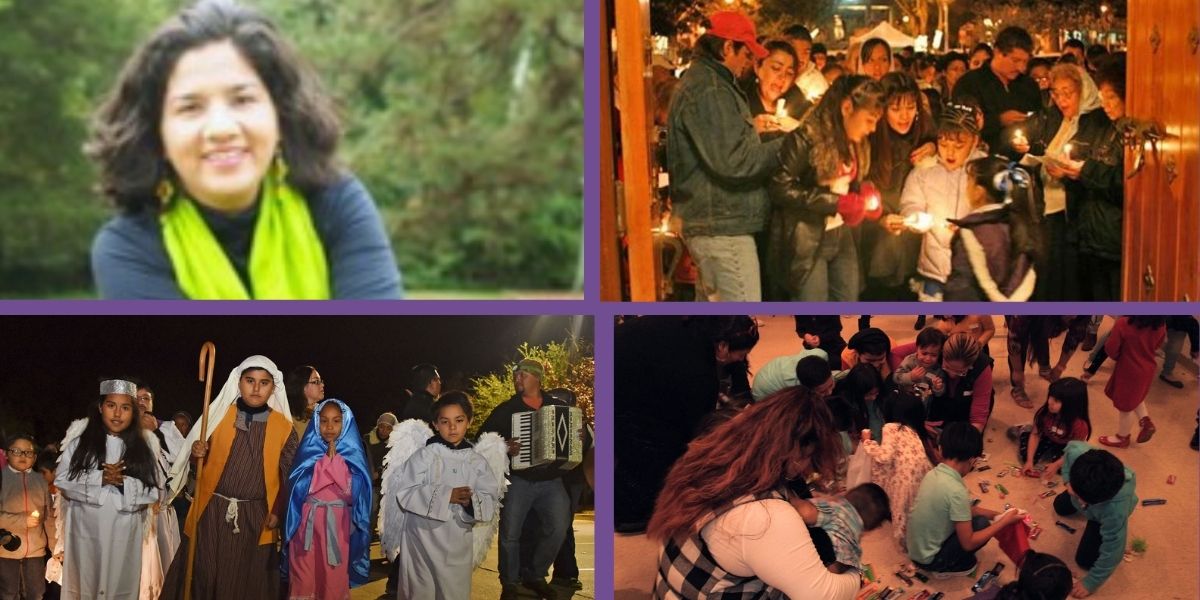
WTS: Talina, tell us more about "Las Posadas"?
Talina: "Las Posadas," which we celebrate at this time of the year, is one of my favorites! All the ingredients for fun, good food, plus meaning behind them. We celebrate the birth of Jesus, and the posadas have connotations of the spiritual battle we all fight and the victory of God over evil.
We celebrate the Posadas from December 16th to December 24th. People gather with traditional food, candy, and fruit. We sing, eat, laugh, and break a piñata.
The Posadas originally come from my Aztec ancestors' traditions and my Spanish ancestors’ arrival and conquest to “New Spain,” which is now Mexico.
The history behind the Posadas says that during December, the Aztecs had celebrations in honor of their God, Huitzilopochtli, precisely around the days of Christmas. During the second half of the sixteenth century, after the arrival of the Spanish conquistadores, the Augustinian monks began to channel these Aztecs' celebrations towards Jesus. They used biblical passages for nine days. Eventually, Diego de Soria, a priest, had permission from Pope Sixtus V to celebrate officially nine masses during the nine days before Christmas.
The Spanish mystic San Juan de la Cruz (1542-1591) added the idea of Mary knocking on doors trying to find a place to stay when she and Joseph arrived at Bethlehem. San Juan and pilgrims carried an image of Mary through the halls of the convent while they knocked on the doors and requested to let her in. The ones inside the doors denied entrance, one after the other. Representing Mary, those outside the doors continued knocking until they arrive at the church, and there, the doors opened for them.
WTS: So, "Las Posadas" recreates Mary & Joseph's seeking a place to stay in Bethlehem? How is that expressed in current celebrations?
Talina: That is exactly what we do during the Posadas! People gather, and we knock on doors singing the traditional posada song; here is the link, if you would like to listen to the song.
We ask those inside the doors to let us in and stay. All of them deny entrance until the last ones finally open. This is when it is realized it is Mary and she is carrying in her womb the Divine Word. They open the doors, and the pilgrims come in.
We sing together, and we eat. The posada ends with a piñata. Piñatas represent sin and evil. The colorful designs on the piñata represent the temptation of sin. The stick we hit it with represents God's power helping us break sin and end evil.
Children and adults hit the piñata with their eyes covered, which represents our faith, since we believe even when we can't see. The rope that moves and shakes the piñata represents the invisible spiritual enemies. When we break the piñata, the breaking symbolizes the triumph of God over evil. Fruit and candy come pouring out of the piñata; these items represent the blessings and grace of God as we fight and triumph over sin.
As you can imagine, there is a lot of fun, good food, and meaning in a posada for us immigrants. Posadas are fun in Mexico, and we look forward to celebrating them every year, but here in the U.S.A., they take new meanings, as we come to this land and hope to be received with hospitality in churches and communities.
If you have not had a chance to attend one, I encourage you to find one in your community. Sometimes Hispanic churches organize them, and you get to eat some of the delicious food and enjoy the fun that comes at no cost.
I find the posadas a beautiful tradition that we love to share with our brothers and sisters in the U.S.A. We celebrate the birth of Jesus, our Savior, in many meaningful ways, and we grow in love for one another as we share a bit more of each other's traditions.
Source: Joel M. Martínez and Raquel M. Martínez, Fiesta Cristiana: Recursos para la Adoración (Nashville: Abingdon Press, 2003), pp. 186-187
(images: https: Las Posadas in the Yucatan, Mexico and at Talina's church - http://www.theyucatantimes.com/2016/12/las-posadas-nine-days-of-celebration-in-mexico/ and from Talina's personal photo collection)
Wesley Theological Seminary offers a range of ways you can study - in person, online or in a hybrid format, with both online and in-person sessions.
We are currently accepting applications for Master of Divinity, Master of Theological Study and Master of Arts programs, as well as our Doctor of Ministry degree programs. Registration for Spring Term courses is now open until January 29,2022.
Learn more and apply by going to https://www.wesleyseminary.edu/admissions/try-a-class-2/
For more information about any of Wesley's programs, contact Admissions at (202) 885-8659 or admissions@wesleyseminary.edu
